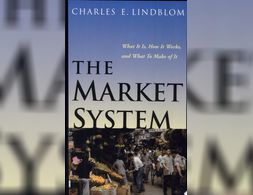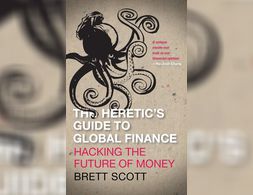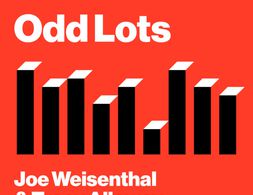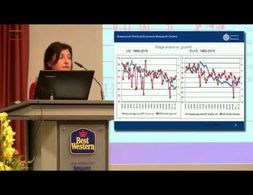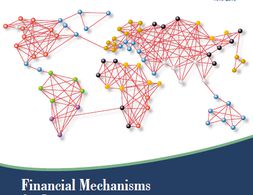869 Ergebnisse
Although money plays a key role in our lives, the workings of our monetary system are a mystery to most of us. ‘The Waterworks of Money’ by cartographer Carlijn Kingma is an attempt to demystify the world of big finance. It visualizes the flow of money through our society, its hidden power made manifest.
If you see money as water, our monetary system is the irrigation system that waters the economy. The better the flow, the more prosperous society will be. Just as water makes crops thrive, so money sets the economy in motion. Or at least that’s the idea. In reality, inequality is growing in many countries and people are dealing with a ‘cost of living crisis’. Meanwhile, the progress with making our economies sustainable is stalling, and financial instability remains an ongoing threat. These problems cannot be seen in isolation from the architecture of our money system. If we truly want to tackle them, we will have to address the design flaws of our current money system.
For more info check: https://www.waterworksofmoney.com or https://www.carlijnkingma.com
For the Dutch version of the animation check: https://www.ftm.nl/waterwerk
Current exhibitions: 'The Future of Money' at Kunstmuseum Den Haag, 14 April, 2023 - 8 September 2023. 'Plumbing The System' at the Dutch Pavilion of the Venice Biennale, 20 May 2023 - 26 November 2023
The second animation video of this series will be released in September 2023.
The Waterworks of Money is a collaboration of cartographer Carlijn Kingma, investigative financial journalist Thomas Bollen, and professor New Finance Martijn van der Linden. Kingma spent 2300 drawing hours, based on in-depth research and interviews with more than 100 experts –ranging from central bank governors and board members of pension funds and banks to politicians and monetary activists.
The structure of our monetary system is not a natural phenomenon. We can choose to change its architecture. Designing the money system– and the laws and institutions that govern it–is ultimately a democratic task, and not a commercial or technocratic one. In practice, however, there is a major obstacle impeding the democratic process: financial illiteracy. By making finance and money needlessly complex, economists, bankers and tax specialists have turned most of us into ‘financial illiterates’. Everyone who doesn’t speak their financial jargon is excluded from the democratic debate on how our monetary system should work.
The Waterworks of Money bypasses the financial jargon. It is an attempt to boost systemic financial literacy. Only if ordinary citizens develop their own vocabulary to participate in the debate about their financial future, can they tell their politicians which kind of ‘financial irrigation system’ they want.
Authors: Carlijn Kingma, Thomas Bollen, Martijn Jeroen van der Linden
Animation: Tiepes, Christian Schinkel, Cathleen van den Akker
Narrator: Loveday Smith
Translation: Erica Moore
Voice recording: Huub Krom
Music and sound: Rob Peters
Photography: Studio OPPA
Partners: Follow the Money, De Haagse Hogeschool, Stimuleringsfonds Creatieve Industrie, Brave New Works, Rabobank, Kunstmuseum Den Haag, Rijksmuseum Twenthe
This panel was part of the conference "Next Generation Gentral Banking - Climate Change, Inequality, Financial Instability" 03. - 05.02.2021.
The current global financial system may not withstand the next global financial crisis. In order to promote the resilience and stability of our global financial system against future shocks and crises, a fundamental reconceptualisation of financial regulation is necessary. This reconceptualisation must begin with a deep understanding of how today's financial markets, regulatory initiatives and laws operate and interact at the global level.
Since 2007, central banks of industrialized countries have counteracted financial instability, recession, and deflationary risks with unprecedented monetary policy operations. While generally regarded as successful, these measures also led to an exceptional increase in the size of central bank balance sheets. The book first introduces the subject by explaining monetary policy operations in normal times, including the key instruments (open market operations, standing facilities, reserve requirements, and the collateral framework).
Whether a black swan or a scapegoat, Covid-19 is an extraordinary event. Declared by the WHO as a pandemic, Covid-19 has given birth to the concept of the economic “sudden stop.” We need extraordinary measures to contain it.
Maria Nikolaidi on how Minsky’s theory has been modelled over past decades and how one can use these models in order to analyse contemporary issues such as financial fragility and financial instability caused by climate change.
This Blog Post describes the U.S. federal reserve money system from the perspective of the Modern Monetary Theory (MMT). Therefore it presents a theory of money creation, gives simple examples how this influences the economy and the historical process of why the monetary system of the US has developed this way.
The Great Recession 2.0 is unfolding before our very eyes. It is still in its early phase. But dynamics have been set in motion that are not easily stopped, or even slowed. If the virus effect were resolved by early summer—as some politicians wishfully believe—the economic dynamics set in motion would still continue. The US and global economies have been seriously ‘wounded’ and will not recover easily or soon. Those who believe it will be a ‘V-shape’ recovery are deluding themselves. Economists among them should know better but are among the most confused. They only need to look at historical parallels to convince themselves otherwise.
This course attempts to explain the role and the importance of the financial system in the global economy. Rather than separating off the financial world from the rest of the economy, financial equilibrium is studied as an extension of economic equilibrium. The course also gives a picture of the kind of thinking and analysis done by hedge funds.
In order to describe the global structure of the monetary and financial system and its effects on the global economy, most economics textbooks rely on unappropriated theories that provide nothing but outdated descriptions. In this talk, key speakers in economics, economic history and banking try to make this complex system a little more understandable by relying on real-world insights.
In this clear and accessible book, an eminent political scientist offers a jargon-free introduction to the market system for all readers, with or without a background in economics
In this lecture, Sanjay Reddy reviews the work of János Kornai, especially his critique of the socialist system, which is rooted in his understanding of the eminently political character of socialism.
Popular anger against the financial system has never been higher, yet the practical workings of the system remain opaque to many people. The Heretic's Guide to Global Finance aims to bridge the gap between protest slogans and practical proposals for reform.
The plumbing of the financial system is coming under strain like never before. On this week’s podcast, we speak with two legendary experts on how the money system works: Zoltan Pozsar of Credit Suisse and Perry Mehrling of the Frederick S. Pardee School of Global Studies. They explain the extreme level of stress we’re seeing, what the Fed has done to alleviate, what more needs to be done, and what the post-crisis future may look like.
Obwohl viele technische Lösungen für gesellschaftliche Herausforderungen wie den Klimawandel auf der Hand liegen, sind wir als globale Gesellschaft häufig nicht in der Lage, diese umzusetzen. Warum führt die kollektive Erfahrung eines kollabierenden Systems nicht zur kollektiven Handlung? Ein Beitrag von Katrin Käufer und Claus Otto Scharmer.
One of the pluralist theories which has gained prominence following the 2008 financial crisis is Hyman Minsky and his Financial Instability Hypothesis (FIH). Minsky was unique in viewing balance sheets and financial flows as the primary components of capitalist economies, and his focus on the financial system meant he was well-equipped for foresee a crisis much like 2008. Although he died long before 2008 his framework anticipated many of the processes which led to the crash, particularly increased risk-taking and financial innovation which would outstrip the abilities of regulators and central banks to manage the system.
This paper presents an overview of different models which explain financial crises, with the aim of understanding economic developments during and possibly after the Great Recession. In the first part approaches based on efficient markets and rational expectations hypotheses are analyzed, which however do not give any explanation for the occurrence of financial crises and thus cannot suggest any remedies for the present situation. A broad range of theoretical approaches analyzing financial crises from a medium term perspective is then discussed. Within this group we focused on the insights of Marx, Schumpeter, Wicksell, Hayek, Fisher, Keynes, Minsky, and Kindleberger. Subsequently the contributions of the Regulation School, the approach of Social Structures of Accumulation and Post-Keynesian approach, which focus on long-term developments and regime shifts in capitalist development, are presented. International approaches to finance and financial crises are integrated into the analyses. We address the issue of relevance of all these theories for the present crisis and draw some policy implications. The paper has the aim to find out to which extent the different approaches are able to explain the Great Recession, what visions they develop about future development of capitalism and to which extent these different approaches can be synthesized.
The world is still feeling reverberations from the financial crisis of 2008 foreseen by neither politicians nor economists The history of capitalism has been punctuated by major crises exposing the fragility of our entire economic system How has capitalism despite these ruptures managed to each time resurface more resilient and …
The video presents different ways of how to measure the money supply and thereby explains the differences between M0, M1 and M2.
Shadow banking became one of the main features of modern market based financial capitalism and financial globalisation. Daniel Gabor locates this development in a Super-Cycle framework and sketches out opportunities to launch a new cycle that is green and just through financial regulation and publicly organised sustainable finance.
This article reviews insights of existing literature on global care chains. A specific focus is laid on the impact that the refugee crisis has on global care chains and in turn how the crisis impacts the de-skilling of the women in the migrant workforce.
The book deals with the financial instability hypothesis of Hyman P. Minsky and its application to current developments. The first part of the work summarizes the hypothesis and mentions works elaborating the hypothesis. The second part applies the hypothesis to the financial crisis 0f 2008/09.
Global Value Chains (GVCs) started to play an increasing and key role in the global economy from the 1990s on. The market mechanism in GVCs supports industrialisation in the Global South and under certain conditions product and process upgrading. But GVCs do not lead to the catching-up of countries in the sense of them approaching real GDP per capita levels comparable with developed countries. These arguments are supported by a critical interpretation of the traditional trade theory, the New Trade Theory and specific approaches to explain GVCs, especially different governance structures and power relationships. Several case studies support these arguments. For catching-up, countries need comprehensive horizontal and vertical industrial policy and policies for social coherence. The small number of countries which managed to catch up did this in different variations.
Özlem Onaran analyses the current problems of secular stagnation from a global perspective. At the core of global economic problems is insufficient demand caused by falling wage shares, because most individual countries, and the world as a whole are “wage-led”. Hence a strategy for global growth is to aim at increasing wages and thus the wage share, and the abandonment of policies focusing purely on national competitiveness. Financialization has broken the link between corporate profitability and investment. Reregulation of finance and higher public investment is required in order to crowd in private investment, in this way, reversing the declining trend of potential output growth.
The authors analyse the role and effects of the US dollar as factual global reserve currency. They demonstrate that a flight into the dollar creates adverse effects for the global economy as it represents a tightening of financial conditions.
Some economic events are so major and unsettling that they “change everything.” Such is the case with the financial crisis that started in the summer of 2007 and is still a drag on the world economy. Yet enough time has now elapsed for economists to consider questions that run deeper than the usual focus on the immediate causes and consequences of the crisis.
Focusing on Kenya’s path-breaking mobile money project M-Pesa, this book examines and critiques the narratives and institutions of digital financial inclusion as a development strategy for gender equality, arguing for a politics of redistribution to guide future digital financial inclusion projects.
For some days, global financial markets are in turmoil. Central banks and governments are dealing with the unfolding crisis on a daily basis with seemingly u...
Professor Jennifer Clapp explains the dynamics of financialization of land and agricultural commodities in Subsaharan Africa. She points to the historical roots of accelerated land speculation and their connection to financial institutions, both generating and reinforcing the process of financialization of African land. Besides talking about roots and dynamics of speculation with land on financial markets, she puts the perspective of scholarly investigation onto the investor's side in discussing guidelines of responsible investment and regulation in the front instead of focussing on the receiving countries.
This report presents the results of the “Financial Mechanisms for Innovative Social and Solidarity Economy Ecosystems” project, designed to foster a better understanding of the different ways in which financial resources can be made available and accessed to support the growth of social and solidarity economy (SSE) organizations and their ecosystems. The project is supported by the Ministry of Labour, Employment and Social and Solidarity Economy of the Government of the Grand Duchy of Luxembourg.
Aim of this intensive workshop is 1.) to introduce the participants to the macroeconomic workings of the climate crisis as the background of sustainable finance; 2.) to introduce financial assets with ESG (Environmental, Social and Governance) criteria attached to them and their markets and important institutional players; 3.) to provide a critical perspective on the current setup of sustainable finance; 4.) and to work on in-depth case studies illustrating the workings on ESG-finance markets, its emitters and traders as well as their macroeconomic implications.
What does political economy say about the global sugar production? Take a look at global trade regulations, intercountry inequalities, and the role of marketing.
Wir nutzen Cookies. Klicke auf "Akzeptieren" um uns dabei zu helfen, Exploring Economics immer besser zu machen!











